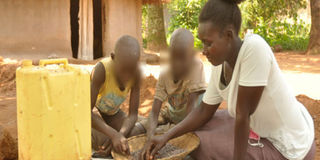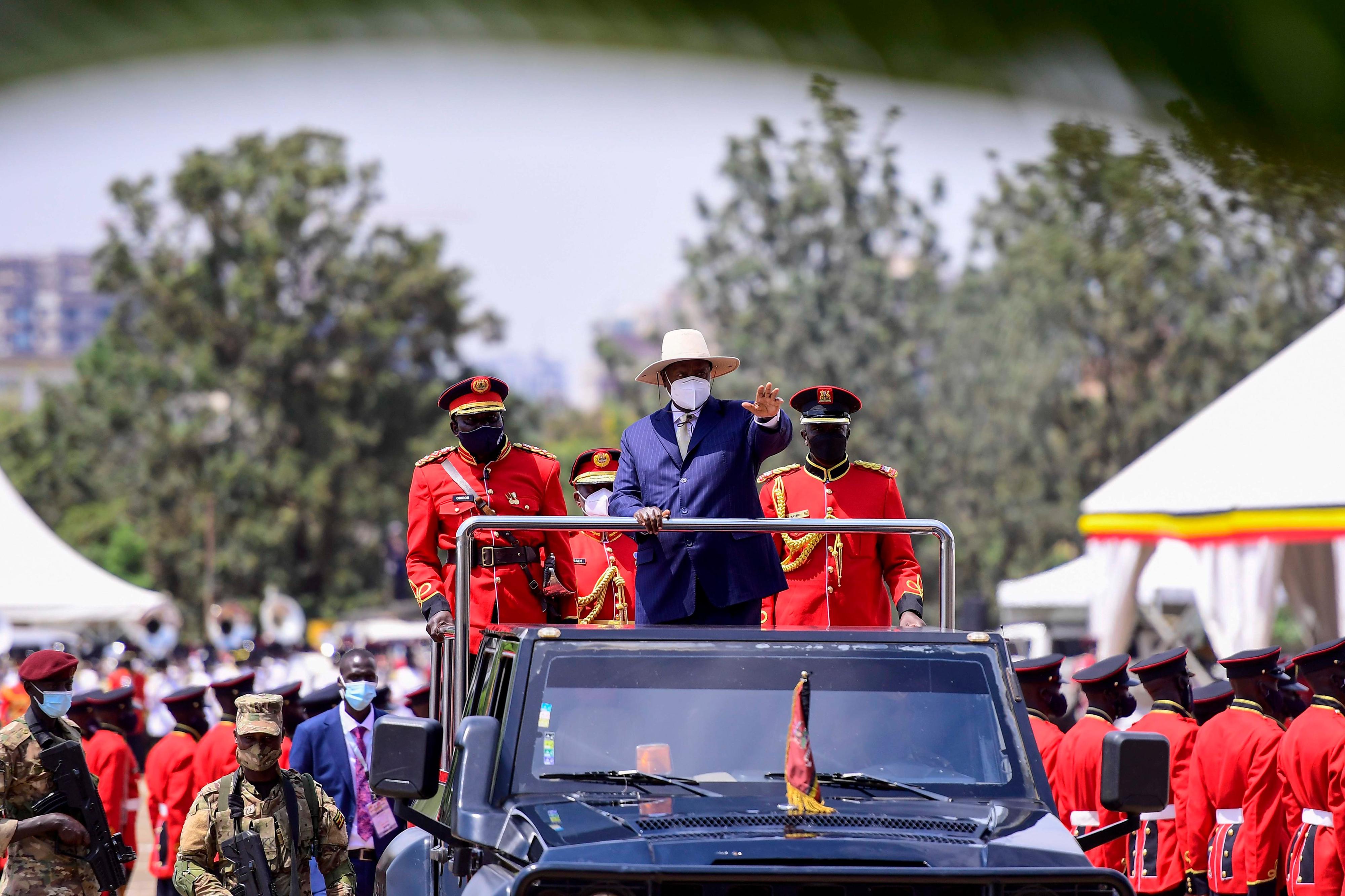Prime
We’re still in the cold, ex-LRA captives cry out

Ms Agnes Adok with her children sort beans in Pece-Cubu Village in Gulu Town last week. PHOTO | TOBBIAS JOLLY OWINY
What you need to know:
- Many women and children who returned from captivity have found it rough to fit in the communities. Some children have resorted to living on the streets and engaging in robberies.
At the age of four, Patrick Ocen, started enduring a miserable life when his parents were killed in a battle between the Lord’s Resistance Army (LRA) and the Uganda People’s Defence Forces soldiers in 1998.
Four years later, he was enrolled in military training as a child soldier in the LRA ranks.
However, in 2005, Ocen was among a group of 26 child soldiers and 16 women who escaped back into Uganda through the Uganda-Sudan border.
He was then 12 years old.
From Gulu District barracks, he was taken to Rachele Rehabilitation Centre in Lira District. After two years, he was taken to GUSCO Centre in Gulu where he had an opportunity to speak on local radios to enable his relatives to identify him.
“It was clear to me that I had no parents even when I spoke on radios. However, one gentleman turned up claiming he was my uncle,” he recalls.
To him, establishing a family or a relative for the first time was a huge relief, although this was short-lived.
He says his new uncle allegedly rebuked him a week later and threw him out of the family.
“He [my uncle] and the other members claimed that they mistook me for another relative of theirs. Since I was neither a relative to them nor a born of that area as they claimed, I decided to relocate to Kitgum Town and started living on the streets in 2005,” Ocen says.
Living on the streets of Kitgum Town marked the beginning of a three-year dark episode that redeemed memories of captivity, especially when he met with his friend with whom they trained as fighters, but returned and failed to trace their relatives.
“In Gulu, we attacked boda boda riders to rob money and valuables from them, started taking marijuana, alcohol and smoking hoping to kill stress. I didn’t care about anything because after all, I had no parents or relatives,” he says.
Despite swallowing the stigma over his background with ease, he and others are still struggling for family identity.
Ms Agnes Adok, a 37-year-old single mother of six, has also been struggling since 2011 to find a home for herself and settle with her children upon returning from captivity.
When she separated from her husband, Mr Charles Otto in 2016, four girls of Ms Adok’s six children were detained by Mr Otto who was influenced by his family to terminate the relationship.
They argued that reuniting with her upon returning from captivity meant misfortunes to the family.
At 12, Ms Adok, together with her two siblings were abducted by the LRA rebels in February 1995 from Pagoro Village, Lamogi Sub-county in Amuru District.
Under the Stokri brigade, Ms Adok was immediately assigned as wife to Mr Otto, a senior officer, with whom she bore the six children.
She currently rents a hut at Pece-Cubu Village in Gulu East Division, Gulu City, where she resides with her two sons.
Women Advocacy Network (WAN), a community organisation advocating for the rights of returnee women and children in the Acholi Sub-region, says the majority of women and children returnees are stuck with life.
Ms Evelyn Amony, the chairperson of WAN, says whereas efforts have been made to ensure that the children are reunited with their families, few relatives have welcomed them back into the community.
“We are trying to reunite these children born in captivity with their families. We will not give up,” Ms Amony, also Joseph Kony’s ex-wife, says.
Estimates put the number of children sired in captivity and have failed to integrate with their families to be about 8,000. The two-decade LRA war saw more than 100,000 people killed and more than 2 million people displaced.
Ms Amony says the approximated 8,000 stranded people are those whose parents bore them from captivity, excluding those who were abducted at a tender age, but returned to equally face rejection due to land and other family property pressure.
While humanitarian bodies in the region have fought to rehabilitate the lives of the returnee women, their ‘captivity children’ have hardly been talked about and fewer efforts have been made by non-governmental organisations or the government to support them.
“Many of these children are now above 20 years and when they want to get partners to start a family, they have no family to legalise their relationship. They are also scattered in urban centres across the region,” she adds.
Recently, while in Gulu City, the Internal Affairs minister, Maj Gen Kahinda Otafiire, regretted the horrible life of children and youth believed to be part of the LRA returnees across the region.
“Those people are unfortunately a result of the 20 years of senseless conflict in this region, these are people who missed going to school, and their families were disrupted and have been rejected by society. You look at their past and their future, it is dark, and they are a lost generation,” Gen Otafiire said.
He advised the government to put in place youth skilling programmes that can rehabilitate the returnees. “It is the responsibility of society to also rehabilitate them,’’ Gen Otafiire added.
For more than 15 years, child-tracing programmes have been conducted by several organisations, including Justice and Reconciliation Project (JRP), Caritas, and Acholi Religious Leaders Peace Initiative (ARLPI).
According to JRP, successful child tracing has promoted a sense of belonging among the children and enabled access to education. But Ms Amony says the complexity of the Acholi culture regarding family inheritance, specifically land, has perpetuated rejection.
“The question of land does not only affect the returnees’ children, but also their mothers. The Acholi culture demands that a woman only owns land when she is legally married into a certain family, this is not the case with the women who were abducted and forced into marriages,” Ms Amony says.
“Some of our families say they don’t have land to accommodate these children [returnees], especially since their identity [fathers] are not known. Other women are even conditioned by their families to chase the children away before they can be embraced and allowed back into the family,” she adds.
SURVEYS
A 2018 study by the Firoz Lalji Centre for Africa Research titled Politics of Return, which explores the return and reintegration of ex-rebels, indicates that poverty and denied access to land for returnees have hampered their reintegration and recovery.
“The returnees face comparably difficult situations when they return to their original homes due to rejection, trauma and denial of access to family assets such as land,” the survey states.
The study that was conducted in the districts of Gulu, Nwoya and Amuru, targeted children born during the LRA war to identify the gaps that exist in their birth registration. The findings further revealed that most children born in LRA captivity were born in DR Congo, the Central African Republic or South Sudan.
Another 2018 Justice and Reconciliation Project (JRP) report indicates that 90 percent of the 447 returnee women sampled, suffered stigmatisation, rejection, trauma, behavioural challenges, failure to meet basic needs, and failed access to land.
Data from Women Advocacy Network (WAN) indicates that at least 10,000 women who returned from captivity in the past are scattered all over the Acholi Sub-region. Seventy percent of the numbers can neither own nor access family (customary land) to grow crops to sustain their ‘fatherless’ children. WAN currently supports about 700 war-affected women.




